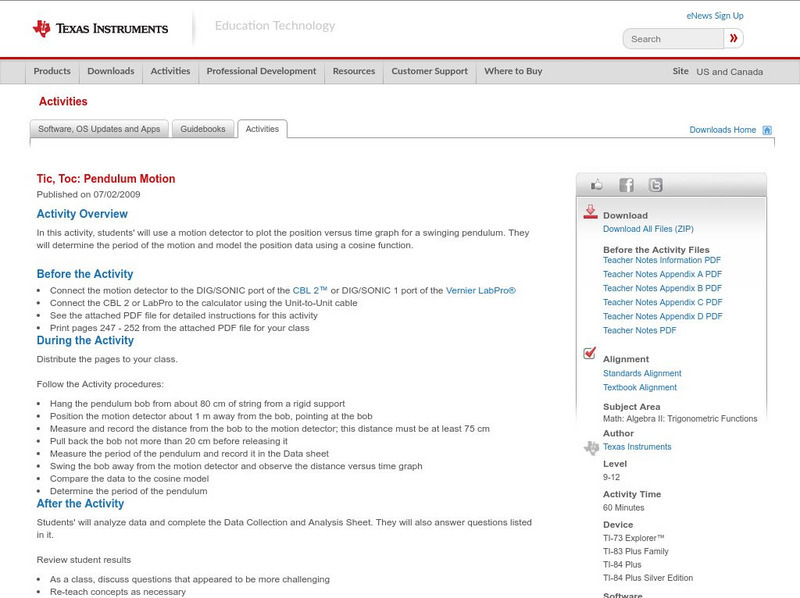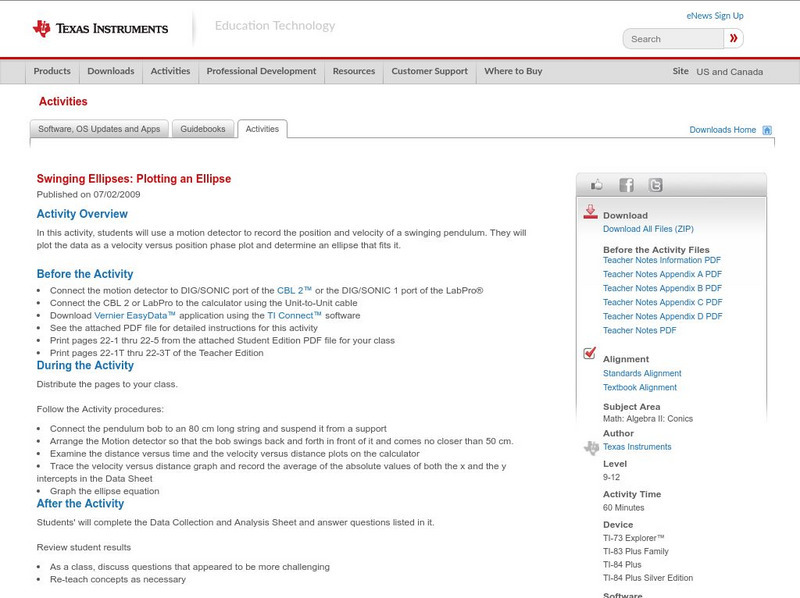Curated OER
Swinging Pendulum
Students engage in an activity which demonstrates how potential energy (PE) can be converted to kinetic energy (KE) and back again. Given a pendulum height, students calculate and predict how fast the pendulum will swing by understanding...
Curated OER
Oscillations
Students construct and compare the actions of various pendulums. In this pendulum motion lesson, students build and test different types of pendulums. They conduct experiments with the length of the swing arm and apply mathematical...
Curated OER
Motion of a Bouncing Ball
Twelfth graders complete a unit of lessons on derivatives as they are applied to motion. They observe and discuss demonstrations, conduct an experiment involving a motion sensor, graph and analyze the results, and summarize their findings.
Curated OER
Swing in Time
Learners examine the motion of pendulums and come to understand that the longer the string of the pendulum, the fewer the number of swings in a given time interval. They see that changing the weight on the pendulum does not have an...
Purdue University
The Represented World: Recreational STEM
How are forces and motion important to a swing set? Scholars explore the concepts of force and motion using swing sets. In preparation for their own STEM design project, individuals take surveys and data from peers, complete labs on...
Curated OER
Rock-A-Bye Pendulum
Third graders use the scientific process to explore the effects of force on an object in motion. They demonstrate that the greater the force applied to an object, the greater the change in speed or direction of the object. They...
Curated OER
Strings and Springs
Ninth graders explore physics with springs and strings. In this force and motion instructional activity, 9th graders rotate through four stations exploring how various springs stretch and bounce, and how mass and length affect a...
Curated OER
The Swinging Pendulum
Students observe a pendulum and graph their observation. In this algebra instructional activity, students use the TI calcualtor to graph the motion the pendulum makes. They analyze the graph and make predictions.
Curated OER
Physics: Eigenvalues
Students solve problems by discovering the eigenvalues that satisfy design questions. They explain how relaxing a small angle approximation can change the solution. Students apply the numerical model of pendulumm motion to solve the...
Curated OER
Frequency vs. Size
Students identify and interpret sound as a vibration and what period and frequency are. They also divide the various types of objects so that all objects are explored and the procedures are determined by the students.
Finally, students...
Colorado State University
If You Can't Predict the Weather, How Can You Predict the Climate?
Why is the weather man wrong so often? Young climatologists discover how chaos rules both weather and climate through a math-based activity. Using an iterative equation, the class examines how small day-to-day weather events total up to...
Curated OER
iChat AV and iSight Camera
Pupils interact with science and math classes around the world by doing the same experiment and communicating their results. They use iChat AV and an iSight camera to share relevant information about their area, decide on the...
Curated OER
Exploration 1: Instantaneous Rate of Change Function
In this function activity, students read word problems and write functions. They determine the instantaneous rate of change and identify intervals. This three-page activity contains approximately 20 problems.
Texas Instruments
Texas Instruments: Tic, Toc: Pendulum Motion
In this activity, students' will use a motion detector to plot the position versus time graph for a swinging pendulum. They will determine the period of the motion and model the position data using a cosine function.
Khan Academy
Khan Academy: Trig and Forces: The Pendulum
Using Newton's Laws of motion to calculate the acceleration of a pendulum as well as to compute and draw its position along the swing and move about the screen in a computationally based graphic system.
Texas Instruments
Texas Instruments: Swinging Along
Students model the data from the motion of a pendulum by a periodic function. They relate its parameters to the time for one period, the distance it is pulled back, and its distance from the motion detector.
Texas Instruments
Texas Instruments: Swinging Ellipses: Plotting an Ellipse
In this activity, Students can use a motion detector to record the position and velocity of a swinging pendulum. They will plot the data as a velocity versus position phase plot and determine an ellipse that fits it.

















